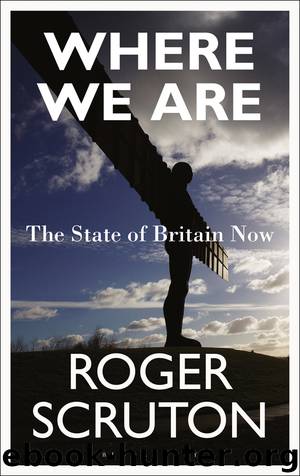Where We Are by Roger Scruton

Author:Roger Scruton
Language: eng
Format: epub
Publisher: Bloomsbury Publishing
That famous statement is not the last word on the question, but it is the first word and was, during my youth, the received opinion of all educated people. The law, we believed, would protect the heretics, the dissidents and the doubters against any punishments devised to intimidate or silence them, for the very reason that truth and argument are sacred, and must be protected from those who seek to suppress them. Moreover, public opinion has been entirely on the side of the law, ready to shame those who assumed the right to silence their opponents, whatever the matter under discussion, and however extreme or absurd the views expressed.
If that is changing now it is not because the indigenous British people have acquired a sudden desire to silence their critics, but because new forces have made their presence known among us – radical Islam and identity politics being the most evident. Threats to free speech in our country do not stem from our national identity or our legal inheritance. On the contrary, they come from minority factions that cannot easily live with those things and which for that reason are at the root of some of the problems that we are now confronting. Free speech is a sign of a strong first-person plural, which enables people who disagree over fundamental things to live together in a condition of mutual toleration. The growth of rival identities – notably the identity pursued by Islamists, who recognize no particular nation as their home, and the negative identities that have their natural home in universities – has caused the first-person plural to fragment, such that it seems no longer so safe to go public with yesterday’s orthodox opinions.
Identity politics is now a fact of life, and in the next chapter I will consider its wider implications. But it is worth noting that, though the threat to free speech is serious, the British people have shown a strong determination to resist it. Our first-person plural is centred on the belief that we are accountable to each other, as people who share a land and the liberties that are protected there. The remedy for conflict is not armed confrontation but free discussion of our differences. The adversarial procedure of the common-law courts is therefore the model that we instinctively follow, whenever conflict looms. To silence one side to a dispute, we believe, is to ensure that the dispute will worsen.
Whoever wields power in our society does not possess that power from some external source – so we believe. He possesses it because we ourselves have conferred it. And because we have conferred it he is accountable to us, and will be judged by the law, should he abuse his office. Power, in the British conception, is never simply power over others, but always power conferred by those others, and any departure from this rule is resented – perhaps not consciously, but with a firm sense of the impertinence of the one who is bossing us about.
Download
This site does not store any files on its server. We only index and link to content provided by other sites. Please contact the content providers to delete copyright contents if any and email us, we'll remove relevant links or contents immediately.
The remains of the day by Kazuo Ishiguro(8999)
Tools of Titans by Timothy Ferriss(8396)
Giovanni's Room by James Baldwin(7346)
The Black Swan by Nassim Nicholas Taleb(7129)
Inner Engineering: A Yogi's Guide to Joy by Sadhguru(6795)
The Way of Zen by Alan W. Watts(6614)
The Power of Now: A Guide to Spiritual Enlightenment by Eckhart Tolle(5781)
Asking the Right Questions: A Guide to Critical Thinking by M. Neil Browne & Stuart M. Keeley(5775)
The Six Wives Of Henry VIII (WOMEN IN HISTORY) by Fraser Antonia(5515)
Astrophysics for People in a Hurry by Neil DeGrasse Tyson(5190)
Housekeeping by Marilynne Robinson(4447)
12 Rules for Life by Jordan B. Peterson(4304)
Ikigai by Héctor García & Francesc Miralles(4274)
Double Down (Diary of a Wimpy Kid Book 11) by Jeff Kinney(4272)
The Ethical Slut by Janet W. Hardy(4253)
Skin in the Game by Nassim Nicholas Taleb(4248)
The Art of Happiness by The Dalai Lama(4130)
Skin in the Game: Hidden Asymmetries in Daily Life by Nassim Nicholas Taleb(4007)
Walking by Henry David Thoreau(3962)
